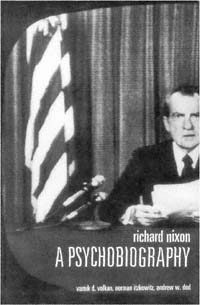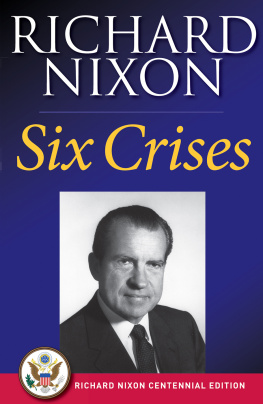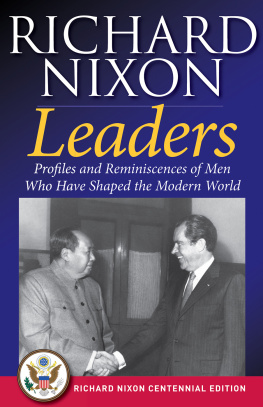Cover

| title | : | Richard Nixon : A Psychobiography |
| author | : | Volkan, Vamik D.; Itzkowitz, Norman.; Dod, Andrew W. |
| publisher | : | Columbia University Press |
| isbn10 | asin | : | 0231108559 |
| print isbn13 | : | 9780231108553 |
| ebook isbn13 | : | 9780585383750 |
| language | : | English |
| subject | Nixon, Richard M.--(Richard Milhous),--1913- --Psychology, Presidents--United States--Biography. |
| publication date | : | 1997 |
| lcc | : | E856.V58 1997eb |
| ddc | : | 973.924/092 |
| subject | : | Nixon, Richard M.--(Richard Milhous),--1913- --Psychology, Presidents--United States--Biography. |
Page i
Richard Nixon A Psychobiography
Page iii
Richard Nixon A Psychobiography
VAMIK D. VOLKAN
NORMAN ITZKOWITZ
ANDREW W. DOD

Page iv
Columbia University Press
Publishers Since 1893
New York Chichester, West Sussex
Copyright 1997 Columbia University Press
All rights reserved
Library of Congress Cataloging-in-Publication Data
Volkan, Vamik D., 1932
Richard Nixon : a psychobiography / Vamik D. Volkan, Norman Itzkowitz,and Andrew W. Dod.
p. cm.
Includes bibliographical references and index.
ISBN 0-231-10854-0 (alk. paper). ISBN 0-231-10855-9 (pbk. : alk. paper)
1. Nixon, Richard M. (Richard Milhous),1913- Psychology.2. PresidentsUnited StatesBiography. I. Itzkowitz, Norman.
II. Dod, Andrew W., 1965- . III. Title.
E856.V58 1997
| 973.924092dc21 | 97-3477 |
 | CIP |
Casebound editions of Columbia University Press books are printedon permanent and durable acid-free paper.
Printed in the United States of America
c 10 9 8 7 6 5 4 3 2 1
p 10 9 8 7 6 5 4 3 2 1
Page v
For Elizabeth, Leonore, and Susie
Page vii
Contents
|
| Foreword by Blema Steinberg | ix |
| Acknowledgments | xi |
|
|
| 1. Why a Psychoanalytic Biography? | 1 |
|
|
| PART ONE: The Life of Richard Nixon | 21 |
| 2. Nixon's Parents | 23 |
| 3. Childhood and Adolescence | 32 |
| 4. Adulthood | 40 |
| 5. Nixon as a National Figure | 53 |
|
|
| PART TWO: The Mind and Personality of Richard Nixon | 67 |
| 6. A Bird's Eye View | 69 |
| 7. Nixon's Personality: Exaggerated Self-Loveand Dependency | 89 |
|
|
| PART THREE: The Three Faces of Nixon's Personalityin Policymaking and in Defeat | 107 |
| 8. Reflections of Grandiosity | 109 |
| 9. Reflections of the Peacemaker | 118 |
| 10. The Final Face: Enemies Everywhere | 128 |
|
|
| PART FOUR: Afterword | 141 |
| 11. The Real Richard Nixon and the Resurrectionof His Reputation | 143 |
|
|
| Notes | 151 |
| References | 169 |
| Index | 177 |
|
Page ix
Foreword
Blema S. Steinberg
In their study of Richard Nixon, authors Vam&305;k Volkan, NormanItzkowitz, and Andrew Dod have made a major scholarly contribution.Although there have been numerous political, historical, and psychological studies of Nixon written to date, this is the first detailed psychoanalyticportrait that has been made of this president, in terms of providing biographical information in conjunction with methodological references.What emerges from the pages of this book is an enhanced understandingof how and why Nixon developed into an excessively self-sufficient, ambitious, and driven man who so desperately needed to be number one.
From their knowledge of normal child development, the authors havepinpointed specific traumatic events that occurred in Nixon's early lifethat led to the psychic derailment he experienced as he was growing up.Nixon's undisputed strengths as a political figure, his love of power, hisdetermination, his ability to intellectualize and rationalize, and hisrefusal to accept defeat are explored within the parameters of the personality structure that formed within him.
Nixon's unconscious need for punishment and the reasons for hisbehaviorwhich, as we all know, culminated tragically for both him andthe nation in the Watergate crisis that led to his resignationis skillfullydocumented from earliest childhood through adolescence and adulthood. The authors provide insight into other unanswered questions
Page x
about Nixon as well, such as his insistence on retaining the incriminatingtapes. The matter of the smoking gun, which has long puzzled so manyobservers, can be explained by what psychoanalysts term oral greedinessand anal retentiveness on Nixon's part. The collection of tapes appearsto have afforded Nixon a certain degree of emotional securitythey represented tangible evidence for him that he was both powerful and loved.
The Nixon who emerges from the pages of this book is a truly humanized figure and a rather poignant one. He materializes as a troubledmana classic example of the type of individual who somatizes andbecomes physically ill whenever his grandiosity is not supported sufficiently by those around him. Specifically, Nixon's periodic bouts withsinus trouble and the timing of these occurrences are shown to be linkedto anniversary reactions to his parents' deaths; and his development ofpainful phlebitis occurred at the height of the critical Watergate revelations, when external support for his narcissism was in short supply and atits lowest ebb.
In the realm of domestic and foreign policy, Volkan and his colleaguesexpose the unconscious determinants of many of Nixon's political decisions. His support of Vietnamization, for instance, was an expression ofhis emotional need for self-sufficiency and reflected his belief that onlyhe could end the Vietnam war, a belief that underlined his grandiosity.
As a psychoanalyst and a political scientist, I believe that this psychobiographical portrait of Richard Nixon is notable for reasons that gobeyond the light it sheds on a public figure who remains an enigma,despite the volume of research that exists on him. Firstly, it enriches thedomains of both psychoanalysis and political science: the former,because it provides a powerful riposte to those psychoanalysts who areskeptical that useful analytic insights can ever be derived from any sourceother than the sanctity of the couch; the latter, because it offers convincing evidence that determinants of political behavior cannot be derivedsolely from the external environmentthat the unconscious needs,fears, and fantasies of political leaders play a significant role. Secondly,this type of profile serves to educate the general reader about the valueof conducting leadership studies. More specifically, systematic analysis ofirrational leadership behavior can contribute to an ability to understandit and cope with it. In the case of a world leader such as Richard Nixon,the implications of irrational behavior have proved to have a profoundimpact on the realms of both domestic and foreign policy.
Next page












